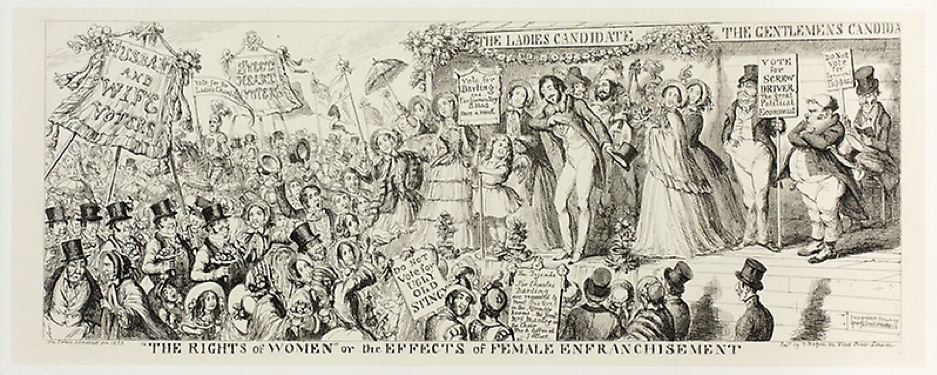
Image: The rights of women – or the effects of female enfranchisement, by George Cruikshank, 1853. Fagan Collection of Political Prints, Pol P 5
Exhibition
Friday 7 September to Sunday 2 December 2018 Weston Gallery, DH Lawrence Pavilion, Nottingham Lakeside Arts, University Park, Nottingham NG7 2RD
11am-4pm Tuesday-Friday
Noon-4pm Saturday-Sunday
Closed on Mondays
Admission FREE
The year 2018 marks the centenary of the first UK general election in which some women were entitled to vote. We celebrate that fact by looking back at some memorable elections and exploring how electioneering has changed over the years.
Before the first Reform Act of 1832, few people could vote and powerful aristocrats could sway the results. Papers from the disputed Cumberland election of 1768 reveal stories of coercion, bribery and corruption. Printed ballads and posters give a flavour of the songs and spectacles which attended elections in Nottingham in the early years of the 19th century.
Personalities feature heavily in the exhibition. The 4th Duke of Newcastle is shown opposing the Reform Act, and fiercely criticizing his own son’s election campaign in South Nottinghamshire in 1846. Discover the fascinating story of James Morrison, the wealthy MP for Nottingham East lauded as ‘the friend of the poor’. And learn about the suffragists and suffragettes who campaigned for equal voting rights in the late 19th and early 20th centuries.
Using original archives and rare books, this exhibition will illuminate 250 years of political campaigning.
The exhibition has been curated by staff from Manuscripts and Special Collections at the University of Nottingham.
Free Talks
There will be a series of free talks to accompany the exhibition in the Djanogly Theatre. All talks start at 1pm and will last for approximately one hour. Places are limited so please book in advance on 0115 846 7777
A Great Electioneer and his Motives Reconsidered: The 4th Duke of Newcastle – Thursday 27 September
The ‘Great’ Reform Act of 1832 attempted a transformation in the system of parliamentary representation. In what ways did those who opposed the act interpret these changes and feel its consequences? Richard Gaunt, Associate Professor in History at the University of Nottingham, studies a notorious local ‘boroughmonger’ to see different perspectives from those usually advanced in the history books.
Women’s Suffrage up to 1928 – Wednesday 24 October
Val Wood of the Nottingham Women’s History Group considers the impact of the franchise for the women of Nottingham in terms of women’s political representation and suffrage activism in the city from 1918 to 1928. Val refers to the first women councillors and discusses the possible reasons why it took so long to return a female member of Parliament.
New Dawn? The 1997 general election – Wednesday 21 November
1997 represented a dramatic turnaround for a party out of office since 1979. Some say that to win, Blair transformed Labour out of all recognition. Others counter that the party had no alternative but to become ‘New Labour’ and that under Blair it remained true to its historic mission of making society fairer. This talk by Steven Fielding, Professor of Political History at the University of Nottingham, reflects on some of the issues raised by the election, many of which remain relevant today.






